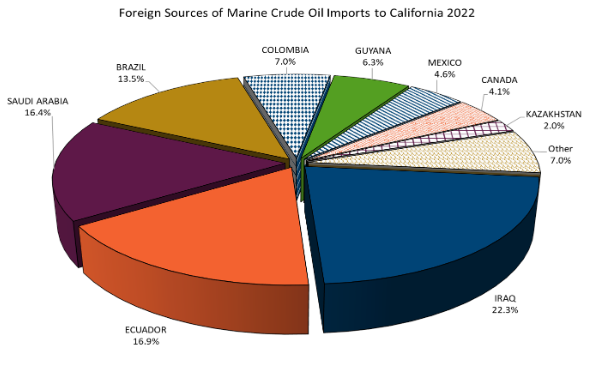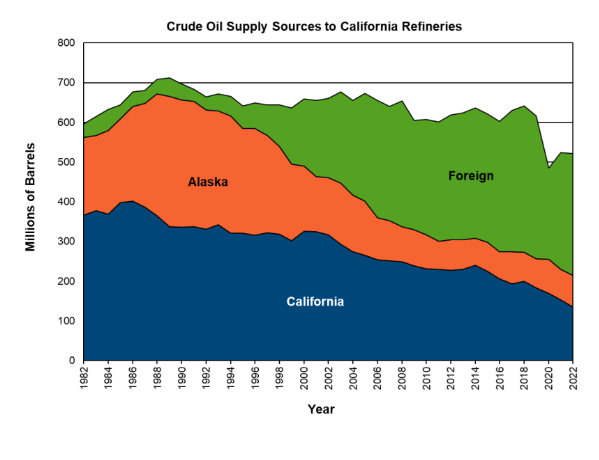The state of California recently issued proposed regulations to ban fracking outright, threatening thousands of jobs and billions in economic activity in the Golden State.
The proposed rules, issued by the Department of Conservation’s Geologic Energy Management Division this month, fulfill a 2021 order from Gov. Gavin Newsom to issue regulations aimed at ending fracking and phasing out energy production entirely by 2045. Gov. Newsom had already established a de facto ban on fracking by stalling permitting over the past three years, but these new rules would take matters further, enacting a formal ban on new fracking permits potentially as early as October of this year.
“We simply don’t have that authority.”
Newsom’s executive order in 2021 to issue rules ending fracking permits was a significant flip-flop for the governor, who initially insisted he lacked legal authority to unilaterally ban fracking:
“We simply don’t have that authority,” Gavin Newsom said last September of a fracking ban he went ahead and pronounced today anyway.
— Kevin Kiley (@KevinKileyCA) April 23, 2021
“As recently as last fall the Governor asserted he couldn’t ban fracking by fiat. ‘We simply don’t have that authority,’ he said. He was right.” https://t.co/5qlHvjLkKo
— Energy Citizens (@energycitizens) May 4, 2021
However, even after legislative efforts to ban the practice were defeated by moderate California Democrats in April of 2021, Newsom issued an executive order mandating the state develop rules to ban fracking by January of 2024.
Journalists widely connected the executive order to the 2021 recall effort targeting Gov. Newsom. According to the New York Times, “politically, the move was viewed as a way to appease progressive voters as a petition to recall him was expected to qualify for the ballot.” As Politico reported at the time, Newsom intended to use a future fracking ban to diffuse a threat from potential rivals:
“The problem for him now is he’s trying to knock out any possibility of anybody from the left running at him,” said Democratic strategist Steve Maviglio.
While Newsom’s gambit to dissuade potential rivals from entering the recall race proved successful, his previous skepticism of the legality of his administration’s authority to ban fracking is sure to cause more than a few problems for the governor, legally and politically. As the Wall Street Journal noted at the time, Newsom’s fracking ban isn’t just on shaky legal ground, but if implemented the ban could force California taxpayers to compensate drillers and landowners:
“As recently as last fall the Governor asserted he couldn’t ban fracking by fiat.
‘We simply don’t have that authority,’ he said. He was right. Prohibiting fracking at once would also violate the Constitution’s takings clause and require the state to compensate drillers and landowners.”
Californians can weigh in on Newsom’s proposed fracking ban via public comment until March 27.
California Fracking Ban Latest Newsom Policy That’s Made State “Uninvestable”
State regulators estimate Newsom’s fracking ban will cost the state’s GDP a staggering $2 billion per year through 2033 along with millions in tax revenue, especially in Kern County where the overwhelming majority of hydraulic fracturing takes place.
The proposal could also very well impact tens of thousands of high-wage union jobs, a politically critical constituency for Newsom and candidates seeking the Governor’s office in 2026.
However, Newsom’s fracking ban is merely part and parcel of his administration’s broader assault on business that’s making California “uninvestable.” As the Wall Street Journal editorial board wrote last month, California’s relentless assault on oil and natural gas is contributing to a hostile regulatory climate impacting all Golden State businesses:
“California policies have made it ‘riskier than investing in other states, with projects being lower in quality and higher in cost,’ Chevron’s Americas Products business president Andy Walz wrote last month in a filing with the California Energy Commission. ‘Chevron alone has reduced spending in California by hundreds of millions of dollars since 2022.’
“’We have rejected capital projects’ and canceled some ‘due to permitting challenges,’ Mr. Walz noted, adding that California’s ‘arbitrary attacks on a disfavored industry . . . signal to every industry, entrepreneur, manufacturer, and employer that California is closed for business.’” (emphasis added)
Kevin O’Leary of ABC’s Shark Tank has echoed similar sentiments recently, telling Fox Business Newsom is “clueless” when it comes to energy policy:
“The management at the state level and the municipal level is the worst of every state in the union. Gavin Newsom… I wouldn’t let him manage a candy store. He is so clueless to the competition going on between states. I’m an energy investor. I don’t put money in California. I go to North Dakota. I go to Virginia. I go to Oklahoma. I go to Texas…We can’t let a state like California become so uncompetitive, with such weak policy so that capital leaves that place where it needs energy the most.”
Newsom’s formalized proposal to ban fracking follows a California Supreme Court ruling last August that found Monterey County’s Measure Z, which banned all new fracking in its jurisdiction, illegal under state law.
This fall California voters will consider a similar question involving whether to retain a state law that established significant restrictions around new wells. The California Chamber of Commerce estimates the law, which was signed by Newsom in 2022, could cost thousands of jobs along long with significant losses in tax revenue according to previous state estimates. Similar to Newsom’s fracking ban, the California Chamber also argues the 2022 California law could subject “the state to significant risk of legal liability under the takings clause of the U.S. Constitution.”
Gov. Newsom and CA AG Rob Bonta also added California to the list of states and municipalities pursuing frivolous climate lawsuits against energy producers last September, despite a similar case – pushed at the behest of activists – being widely defeated in New York. Bonta, speaking to Fox LA following the filing of the suit last fall, fully admitted the lawsuit could send already sky-high energy costs even higher for consumers:
ELEX MICHAELSON: A lot of people are concerned their gas prices could go up because of this, what do you say to that?
ROB BONTA: We are protecting folks in California, including those who pay for gas. I don’t know what the impacts will be of our effort to hold big oil
accountable, but it must end. (Emphasis Added)
Add that to the fact Californians continue to face high energy prices and constant uncertainty about their power grid, and it is easy to see why California workers and businesses are fleeing the state under Newsom’s leadership.
Ending Fracking in California Will Mean More Emissions and Higher Energy Costs
Newsom’s proposal to end fracking, which could affect up to a fifth of the state’s energy production, will only exacerbate energy dependency on foreign countries. Ironically, evidence clearly shows increasing energy imports will result in both higher emissions and higher costs for consumers – in a state that already boasts the highest prices anywhere in the country.
As EID has documented previously, California’s position as an “energy island” means the vast majority of energy arrives via tankers from foreign nations:
(Source: California Energy Commission, Accessed 2/21/24)

(Source: California Energy Commission, Accessed 2/21/24)
Increasing reliance on foreign imports further complicates the state’s efforts to lower emissions, something Gov. Newsom readily admitted in 2020:
“As it relates to managing decline, we’ve got to address the issue of demand. California since 1985 has declined its production by 60 percent, but we’ve only seen a modest decrease in demand by 4.4 percent. Sixty percent decline in production, but only a 4.4 percent decline in demand. And that means we are making up for a lack of domestic production from Saudi Arabia, Ecuador, and Colombia. And that’s hardly an environmental solution when you look globally.” (emphasis added)
Making matters worse, California’s unique blend of gasoline, which is produced nowhere else in the United States, also must be periodically supplemented with imports from South Korea.
Banning fracking will invariably make these kinds of imports more likely, driving costs even higher for California consumers. Western States Petroleum Association President and CEO Catherine Reheis-Boyd said in a statement to Politico:
“These types of policies are devastating to our state’s energy supplies, which are rapidly shrinking under the Newsom administration, and will likely lead to even higher energy costs for California consumers.”
Bottom Line: California’s extreme and unlawful fracking ban will cost the state billions of economic activity and thousands of jobs, all while driving up emissions associated with foreign energy imports.
The post ‘We Simply Don’t Have That Authority’: Newsom Pushes Fracking Ban He Once Called Illegal appeared first on .

















